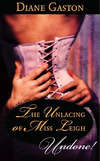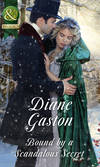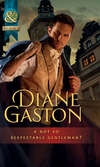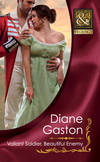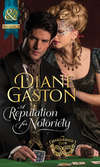Buch lesen: «The Unlacing of Miss Leigh»
Diane lives in Virginia with her husband and too-many-cats. Once a mental health social worker, her days are now filled with writing fictional happy endings. Diane’s Mills & Boon Historical A Reputable Rake won the 2006 Romance Writers of America RITA® award for Best Regency Romance.
Visit her website at http://dianegaston.com.
Contact her at diane@dianegaston.com. She loves to hear from readers.
Author’s Note
There is something about a hero who feels too damaged to be loved that always tugs at my heart. Such a hero needs a heroine who sees below the surface to the man underneath. Is that not what we all want? To be loved for the person we are at our very core?
I hope you enjoy The Unlacing of Miss Leigh, my unabashed homage to Phantom of the Opera and all Beauty and the Beast stories. I’ve included a peek at characters who will appear in my next to-be-titled, to-be-scheduled book and a peek at my heroine in the Mills & Boon July 2009 Regency Summer Scandals anthology. You’ll meet Justine from Justine and the Noble Viscount at a pivotal moment in her life.
The Unlacing of Miss Leigh
Diane Gaston
To Patty Suchy, who always told me I’d love the
movie Phantom of the Opera. She was sooooooo right!
Chapter One
London, June, 1812
A thousand lamps blazed in the elms. Colonnades, fountains, cascades and porticos, while throngs of people of all sorts made up this night of masquerade in Vauxhall Gardens.
Amid this wonder, Margaret Leigh’s heart raced. She was here to meet a gentleman, a man who would pay for her company.
“Are you certain you wish to do this, Maggie?” Her cousin’s brow furrowed. “It is not at all proper.”
She slanted him an amused look. “You are one to speak of propriety.”
Henry had long been the scourge of the family. A schoolmaster’s son and a vicar’s nephew, Henry ran off to join a theater company when he’d barely begun to shave. Now, there was little family left to condemn him, only Margaret and her younger brother.
Henry nodded and waved a hand. “To the devil with propriety, anyway. Life is too short not to seek enjoyment where we can.”
Margaret released a nervous breath. “Well, I cannot afford either enjoyment or propriety at the moment.”
Henry pursed his lips in sympathy. Wearing horns on his head and tight-fitting green trousers and coat, his expression looked nothing more than comical.
Margaret stifled a laugh.
Henry was dressed as Puck in a costume from Covent Garden Theatre where he performed small parts. For Margaret, he had borrowed a fairy costume—a gown of palest blush, its skirts fashioned from so many layers of silk net that she seemed to float as she walked. It was quite the most beautiful gown she’d ever worn.
“Here we are.” Henry stopped at the supper boxes along the South Walk.
Margaret, an impoverished vicar’s daughter, and her cousin Henry, an actor of no renown, were to be guests of the Duke of Manning. For the festivities, the duke had engaged several boxes joined together, decorated with flowers and swags of colorful silks. Already, the boxes seemed filled with people. Most of the gentlemen wore black dominoes, but the women wore a variety of costumes, from rustic milkmaids frocks to elaborate Egyptian princesses’ gowns. The gentleman had arranged his rendezvous with Margaret to take place among the friends of the duke.
Margaret gave Henry a rueful smile. “If our parents could see us now.”
Her cousin laughed. “I envision them collectively rolling over in their graves. I can almost hear your father.” He made a dramatic gesture as if preaching from a pulpit. “…I have written unto you not to keep company, if any man that is called a brother be a fornicator…”
Tears pricked at Margaret’s eyes. “You sound just like him.”
Henry sobered. “My talent for mimicry.”
Margaret’s father had passed away of a sudden apoplexy not two months earlier and grief still overcame her at unforeseen moments. He’d been the last of that generation. They were orphans now, Margaret thought.
Henry’s sympathetic look returned, but he quickly smiled and punched her on the arm. “I daresay your father would consider the Duke of Manning improper company for you.”
“And his friend.” The gentleman she was to meet.
The notorious Duke of Manning had run off with the Earl of Linwall’s wife, set up housekeeping with her, and sired several children by her—the Fitzmanning Miscellany, the society gossips called them. In the supper box, the duke and his lady were easy to recognize, greeting their guests, both dressed in white wigs and colorful brocades that were fashionable decades ago.
Margaret turned back to Henry. “For a man and woman living in sin, they look very happy.”
“They do indeed.” Henry clasped her arm and stepped forward. “The rewards of impropriety.”
They showed their invitation to the footman positioned at the entry to the boxes. As he admitted them, Margaret scanned the gentlemen in black dominoes. His would be lined in red, he’d written to her.
She glimpsed no red.
The words in his advertisement in The Times came back to her.
Seeking an educated lady of genteel birth for companionship. Gentleman of good fortune offers generous compensation.
Margaret had answered the advertisement. She answered every advertisement for companions or governesses, the most common professions for a woman of her station. None yielded any results. When the gentleman mentioned in the ad sent a footman with a written response, Margaret’s hopes surged.
And were immediately dashed.
The companionship the gentleman sought was of a different nature entirely. He sought a mistress.
Behind his rather witty response to her had been a sense of aching loneliness. Margaret wrote back to him, even though it was highly improper to do so. She sent a polite refusal.
He wrote back.
He wrote to her again and again, charming letters of persistent persuasiveness, witty words and despairing loneliness. Each time, she sent back a refusal, but soon the greatest pleasure of her day was seeing his footman arrive at the door with the now-daily letter, then reading its contents.
Eventually, the gentleman proposed a meeting for which he would pay her twenty pounds. He suggested this masked ball at Vauxhall as the location. Twenty pounds was almost as much as she could earn in a year as a lady’s companion or governess.
She needed that money quite desperately.
Her cousin led her to a table of refreshments. She picked up a glass of claret in hopes it would settle her nerves.
“It will be an adventure,” Henry said.
“An adventure,” she repeated under her breath, downing the claret and taking another.
“Good God,” cried her cousin. “There is Daphne Blane.”
Daphne Blane was the darling of the London stage, a most sought-after leading lady and one who often was seen on the arm of a peer.
“How can you tell?” Margaret saw only a woman in a Grecian costume, with a gold mask covering most of her face.
“There is no mistaking her.” Henry put down his glass. “I must greet her. She will be impressed that I am one of the duke’s guests.”
Without Henry at her side, Margaret’s courage flagged. She ought to flee, run down the Grand Walk to where the wherries waited to ferry guests across the river, hop into a hackney coach and return to Henrietta Street.
Instead, she took another fortifying sip of claret and looked for a corner in which to stand.
A young woman dressed as a shepherdess walked up to her. “Do I know you?”
God forbid anyone know her here, else she never would have come.
The masked young woman grimaced. “Oh, dear, that sounded rude, did it not? It is just you are near my age, I think, and if you should be one of my friends, I should be quite ashamed not to know it.”
Margaret smiled. “I am certain you do not know me. I am Miss Leigh.”
The woman offered her hand. “I am Justine Savard, the duke’s daughter.”
Savard was not the duke’s surname, nor Lady Linwall’s. Was Miss Savard the duke’s daughter by another woman?
Her father would roll over in his grave.
Miss Savard returned her smile. “Are you here with someone?”
“I am with my cousin.” Margaret inclined her head in Henry’s direction. “He is Puck.”
“He is your cousin? I wondered who was speaking with Miss Blane.” Apparently Henry was not the only one to recognize the famous actress.
Miss Savard glanced around again, then caught herself and turned back to Margaret. “I fear my manners have quite gone begging.” She looked apologetic. “I am expecting someone.” Her color rose. “My sweetheart.”
Margaret did not know what to say to this obvious confidence. “I hope he arrives soon.”
“Oh, so do I.” Miss Savard glanced around one more time. “More guests are arriving. Papa’s friends. He and Lady Caroline invited everyone, I think. It is a shame his best friend could not attend. Papa and Baron Veall were schoolmates ages ago—”
“Baron Veall.” The blood drained from Margaret’s face.
“Do you know him?”
“No, I do not,” Margaret said too sharply.
Her father’s vicarage had been on land owned by Baron Veall, and one year the baron and his family summered in the great house there. Margaret had only encountered the younger son. One time.
She’d never forgotten him.
Miss Savard chattered on, “Well, the baron declined the invitation, but—it is the oddest thing—his son did not.”
“His son?” Margaret squeezed the stem of her glass.
“His younger son, the captain.”
Margaret’s legs trembled.
"I pine to know why he accepted. My father would not tell me, but I had the distinct impression there was some negotiation—something clandestine—and I do love a mystery, as long as I can solve it." She looked thoughtful. “Perhaps it has something to do with Captain Veall's injuries. He was hurt terribly in the Battle of Fuentes de Oñoro a year ago—”
Margaret well knew this. She’d scoured the lists of injured and dead hoping not to find his name.
“He’s been somewhat of a recluse ever since. My father called upon him once, but the captain refused to see him. Curious that suddenly he’s attending this party.” Miss Savard clutched Margaret’s arm. “Oh, my goodness. There he is. Not Captain Veall. My sweetheart. I would know him no matter his disguise.”
The man who captured her attention wore a simple black domino and looked to Margaret indistinguishable from the others.
“Is he not handsome, my Mr. Kinney?” She gave Margaret an imploring look. “Will you forgive me if I abandon you? I am so eager to see him.”
“By all means.”
Miss Savard rushed to the man’s side.
Margaret lifted her glass to her lips and searched the guests, both hoping and fearing she would see Captain Veall.
She’d been a little girl with hair in plaits and front teeth missing. He’d been a few years older. She had not even given him her name. He would never know her now, even without her mask, but she greatly desired to discover the man he’d become.
Margaret finished her second glass of claret and tried to determine which of the men in black dominoes might be Captain Veall. She walked back to the refreshment table for another claret. The orchestra began to play in the Grove.
Behind her, a man’s deep voice spoke. “Miss Leigh?”
She froze, then turned. She’d almost forgotten why she’d come.
The gentleman was tall, so tall he filled her vision. His domino, like his hair, was as black as the night, but he swirled the fabric to show its red lining. His mask, unlike any of the others, covered one side of his face, not just the top half.
She felt robbed of breath. “I am Miss Leigh.”
His eyes, a startling blue, appraised her. “I am the gentleman with whom you have corresponded.”
“Sir.” She curtsied.
Through the eyehole of his mask Margaret could see an angry red scar that the fabric did not entirely cover. Neither did it cover the drooping of one side of his mouth. The unusual mask was meant to cover his scars, she realized.
She lowered her eyes. “What do I call you?” He’d merely signed his letters A Gentleman.
“Call me Graham.”
Her gaze flew back to his face.
The eyes. She remembered his blue eyes.
That long ago day in the woods when Bob and Hughy Newell threw their sticks and stones at a little girl too small to outrun them, a boy with those blue eyes had come to her rescue. Graham Veall had been her first, nay, her only hero.
“Would you walk with me, Miss Leigh?” His voice seemed to resonate deep in her soul.
It shook her. “You do not wish to stay at the party?”
“I only came for you.” He pressed a purse into her hand.
Her payment. She swallowed.
He was letting her know she had already fulfilled their bargain. She could refuse his request if she wished.
But she wanted to be with him. He was Graham Veall.
“My pleasure, sir,” she murmured.
His eyes creased at the corners. “Graham.”
“Graham,” she repeated in a stronger voice.
He led her through the porticos, away from the throngs of people, away from the music. They walked on a gravel path toward trees with fewer lamps and where shadows loomed ahead. Any trepidation Margaret felt about this meeting had vanished. This was Graham Veall walking at her side. She held his arm and savored the warmth of his skin beneath the silk domino.
Der kostenlose Auszug ist beendet.

